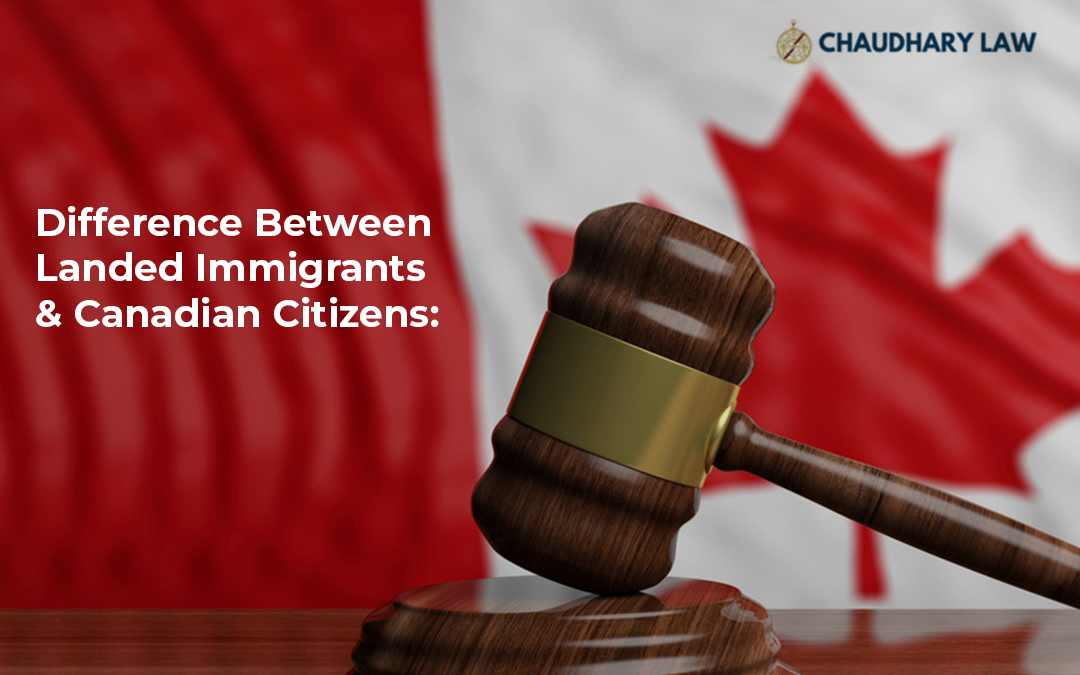Many people can often get confused about the difference between a landed immigrant (or permanent resident) and a Canadian Citizen. It is best to know the difference between a landed immigrant and a Canadian citizen in order to know what are the rights and responsibilities along with privileges that both parties can acknowledge and enjoy.
There definitely are some significant differences between a permanent resident and a Canadian Citizen. In this post, we intend to acknowledge these differences in order to answer any doubts that may arise regarding the status of your long term stay in Canada.
The best way explain the difference between a landed immigrant and a Canadian Citizen is to become a permanent resident. After a few years of enjoying the status of a permanent resident, one can finally apply for their Canadian Citizenship assuming the person is not a citizen of Canada by birth.
Who Is A Landed immigrant?
People that hold the status of Permanent Resident in Canada are also known as landed immigrants. Usually, a lot of people move to Canada on a temporary visa for work or higher studies. Once things work out for them, they can decide to apply for permanent residency in Canada. Many applicants can even enjoy the benefit of applying for permanent residency from the comfort of their home, even if it is outside of Canada.
You may wonder what exactly does the status of a permanent resident entail? Once the Canadian Government approves your PR status, you can work and study in Canada without any limitation on stay in Canada, i.e., if you’re from a different country. Permanent resident status enables you to finally help start making Canada your home and encourage you to prosper. A permanent resident will need to stay in Canada for a total of two years (out of their five years – with some exceptions) in order to securely retain their status as a permanent resident. They otherwise will face the risk of losing their permanent resident status.
You can also opt to obtain your status as a permanent resident through sponsorship. This aspect can be pursued by anyone through the Inland Spousal or Family Class categories. You will have to prove the nature of the relationship with your sponsor and answer a few questions that will only help the officials believe that this is a genuine relationship and hasn’t been made just to get into the country.
With the help of certain programs, such as the Economic Immigrants program, an individual can apply for permanent residency along with their entire family. However, the principal applicant will have to meet the criteria and qualifications for a few programs such as Skilled Worker, Federal Skilled Trades Program, Express Entry, Self Employed categories, a Provincial Nominee Program, and other such programs. Once your application for PR has been approved, you will get the official document (COPR) in your mail stating that your status in Canada is now that of a permanent resident.
However, these are a few things that a permanent resident does not enjoy:
- Run for federal office;
- Hold a Canadian passport;
- Work for some jobs that need a high-level clearance or something that involves sensitive issues;
- Vote in federal elections.
Who Is A Canadian Citizen?
A Canadian Citizen is someone who was born within Canada’s borders or has been granted the status of citizenship through naturalization. A permanent resident who has fulfilled the criteria of applying for citizenship will first have to actually apply for Canadian citizenship to immigration Canada and wait to be accepted as a Canadian citizen.
Requirements for residency in Canada can be quite complex and confusing. But in order to meet the requirements of applying for citizenship in Canada, an individual needs to have spent four years (out of a six years) term period in Canada. Your application for citizenship will be reviewed by officials and if there is something questionable about your application, you will receive a Procedural Fairness Letter addressing the query raised and giving you a chance to respond to it,
A person born outside of Canada but with Canadian parents will also be deemed as a Canadian but not in all cases. Since 17th April 2009, any individual born outside of Canada can be deemed as a Canadian Citizen only if one of their parents is a Canadian citizen and they are the first generation born outside of Canada. There are many other ways for newborns to be deemed as Canadian citizens!
Canada is one of those countries that look forward to welcoming people from all over the world with great skills and intellect to come and settle down here. The Canadian Government is already looking over the requirements of permanent residentship and citizenship. Canada wants to make it easier for individuals to gain their status as citizens or permanent residents. We at Chaudhary Law, are happy to help you take this journey and start anew. Reach out to us to book your free consultation.


I cannot remember when I applied for landed immigrant status in Canada. I am now a Canadian citizen but need to supply the date of application for landing for some official purposes. How can I find out?
A request for the government file on your immigation history would be of benefit
Will you be given any card as a landed immigrant?? If yes ..where and when will that happen when you arrive in Canada
Anecdotally, it may take 4-8 weeks.